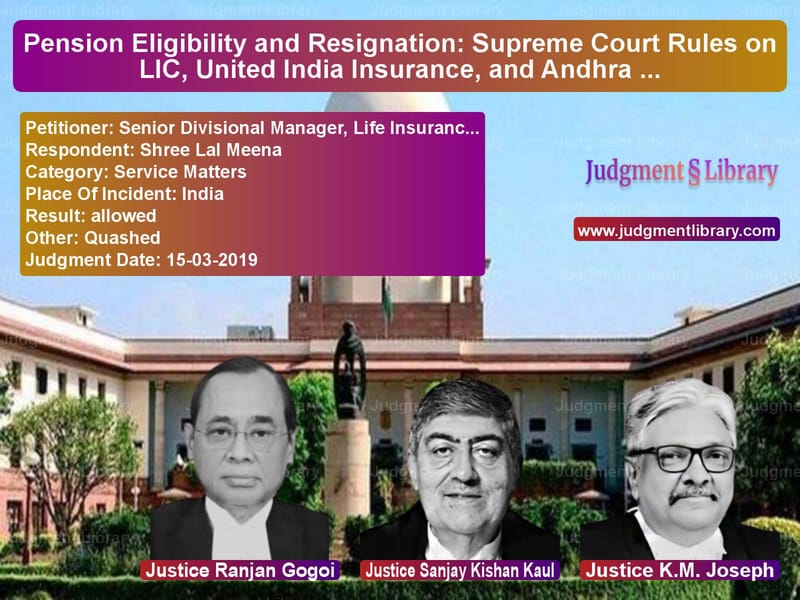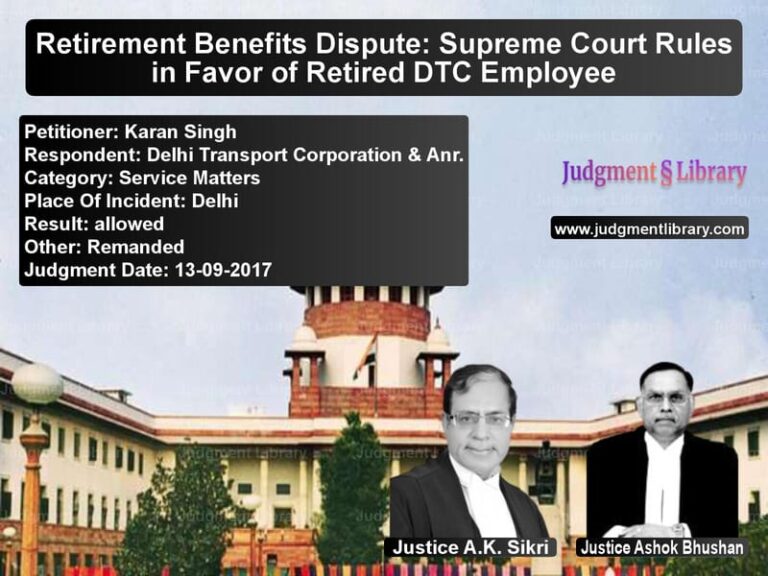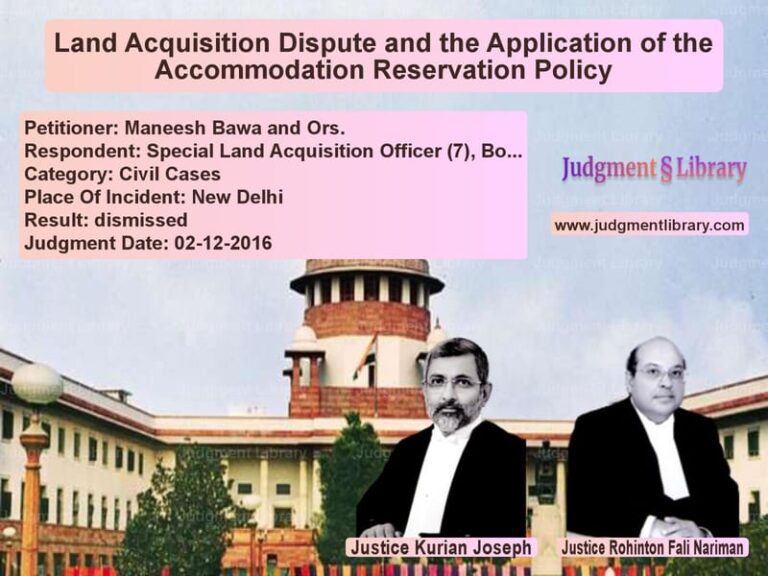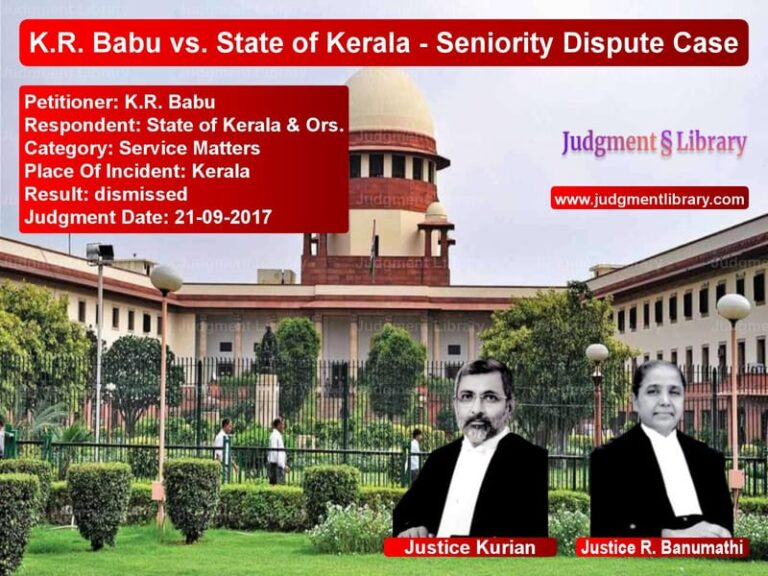Pension Eligibility and Resignation: Supreme Court Rules on LIC, United India Insurance, and Andhra Bank Employees
The Supreme Court of India recently ruled on a critical case concerning pension eligibility for employees who resigned before pension schemes were formally notified but after their retrospective applicability date. The case, Senior Divisional Manager, Life Insurance Corporation of India & Ors. vs. Shree Lal Meena, along with connected appeals involving United India Insurance and Andhra Bank, addressed whether such employees could claim pension benefits despite resigning before the schemes came into effect.
The Court examined the fundamental differences between resignation and retirement, the intent behind pension regulations, and the financial implications of extending pension benefits to those who had resigned before the schemes were implemented.
Background of the Case
The appellants in the case included the Life Insurance Corporation of India (LIC), United India Insurance Company, and Andhra Bank, while the respondents were former employees who had resigned before the pension schemes were formally notified.
The key timeline of events was as follows:
- Employees resigned from service between 1990 and 1993.
- Pension schemes were introduced in 1995 but applied retrospectively from 1 November 1993.
- The respondents claimed that they should be entitled to pension benefits as they were in service after 1 January 1986, a cut-off date specified in the pension regulations.
- The appellants denied the claims, arguing that resignation led to forfeiture of past service, disqualifying the employees from pension benefits.
Petitioner’s Arguments
The appellants (LIC, United India Insurance, and Andhra Bank) put forth the following arguments:
- The pension regulations clearly stated that resignation led to forfeiture of past service, making resigned employees ineligible for pension benefits.
- Retirement and resignation are distinct in service jurisprudence, with pension benefits specifically intended for retired employees.
- The regulations explicitly covered employees who “retired” within the applicable period but did not mention those who had resigned.
- The financial implications of extending pension benefits to resigned employees would disrupt the actuarial calculations on which the pension schemes were based.
Respondent’s Arguments
The respondents, former employees seeking pension benefits, argued:
- They had completed over 20 years of service, fulfilling the eligibility criteria for pension.
- At the time of their resignation, there was no voluntary retirement scheme available, leaving them with no option but to resign.
- The retrospective application of the pension scheme should include them, as they were in service after 1 January 1986.
- Their resignation should be treated as voluntary retirement in spirit, allowing them to claim pension benefits.
Supreme Court’s Observations
The Supreme Court analyzed the distinctions between resignation and retirement, emphasizing:
“Resignation entails forfeiture of service, under Rule 23 of the Pension Rules. If an employee resigns during the applicability of pension rules, they lose all pensionary benefits. Applying pension benefits to employees who resigned before the rules were framed would create an inconsistency.”
The Court further clarified:
“The expression ‘retirement’ under the Pension Rules does not include ‘resignation.’ The rules clearly distinguish between employees who retired and those who resigned, and employees who voluntarily resigned cannot retrospectively claim benefits of a scheme that did not exist at the time.”
The Court examined similar cases and confirmed that resignation leads to severance of service, unlike voluntary retirement, where employees maintain eligibility for retiral benefits.
Final Judgment
The Supreme Court ruled as follows:
- The appeals by LIC, United India Insurance, and Andhra Bank were allowed.
- The judgments in favor of the respondents (retired employees) were set aside.
- Employees who resigned before the pension scheme was notified were not entitled to pension benefits.
The Court concluded:
“When the Legislature, in its wisdom, brings forth certain beneficial provisions in the form of Pension Regulations from a particular date and on particular terms and conditions, aspects that are excluded cannot be included by implication.”
Implications of the Verdict
The Supreme Court’s decision has significant implications for pension law and employee benefits:
- Distinction Between Resignation and Retirement: The ruling firmly establishes that employees who resigned before the pension scheme’s notification cannot claim pension benefits.
- Legal Precedent for Public Sector Employees: The decision clarifies pension eligibility for resigned employees in all public sector enterprises.
- Employee Awareness: The judgment highlights the importance of understanding the long-term implications of resignation versus retirement.
By reinforcing the principles of pension eligibility, the Supreme Court has ensured clarity in how pension benefits are determined for public sector employees, balancing the interests of both employers and employees.
Petitioner Name: Senior Divisional Manager, Life Insurance Corporation of India & Ors..Respondent Name: Shree Lal Meena.Judgment By: Justice Ranjan Gogoi, Justice Sanjay Kishan Kaul, Justice K.M. Joseph.Place Of Incident: India.Judgment Date: 15-03-2019.
Don’t miss out on the full details! Download the complete judgment in PDF format below and gain valuable insights instantly!
Download Judgment: Senior Divisional Ma vs Shree Lal Meena Supreme Court of India Judgment Dated 15-03-2019.pdf
Direct Downlaod Judgment: Direct downlaod this Judgment
See all petitions in Pension and Gratuity
See all petitions in Public Sector Employees
See all petitions in Judgment by Ranjan Gogoi
See all petitions in Judgment by Sanjay Kishan Kaul
See all petitions in Judgment by K.M. Joseph
See all petitions in allowed
See all petitions in Quashed
See all petitions in supreme court of India judgments March 2019
See all petitions in 2019 judgments
See all posts in Service Matters Category
See all allowed petitions in Service Matters Category
See all Dismissed petitions in Service Matters Category
See all partially allowed petitions in Service Matters Category







